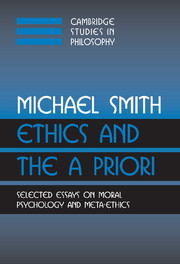Book contents
- Frontmatter
- Contents
- Preface
- Sources
- Introduction
- Part One Moral Psychology
- 1 Internal Reasons
- 2 The Incoherence Argument: Reply to Schafer-Landau
- 3 Philosophy and Commonsense: The Case of Weakness of Will (co-authored with Jeanette Kennett)
- 4 Frog and Toad Lose Control (co-authored with Jeanette Kennett)
- 5 A Theory of Freedom and Responsibility
- 6 Rational Capacities
- 7 On Humeans, Anti-Humeans, and Motivation: A Reply to Pettit
- 8 Humeanism, Psychologism, and the Normative Story
- 9 The Possibility of Philosophy of Action
- Part Two Meta-Ethics
- Index
- References
4 - Frog and Toad Lose Control (co-authored with Jeanette Kennett)
Published online by Cambridge University Press: 04 December 2009
- Frontmatter
- Contents
- Preface
- Sources
- Introduction
- Part One Moral Psychology
- 1 Internal Reasons
- 2 The Incoherence Argument: Reply to Schafer-Landau
- 3 Philosophy and Commonsense: The Case of Weakness of Will (co-authored with Jeanette Kennett)
- 4 Frog and Toad Lose Control (co-authored with Jeanette Kennett)
- 5 A Theory of Freedom and Responsibility
- 6 Rational Capacities
- 7 On Humeans, Anti-Humeans, and Motivation: A Reply to Pettit
- 8 Humeanism, Psychologism, and the Normative Story
- 9 The Possibility of Philosophy of Action
- Part Two Meta-Ethics
- Index
- References
Summary
“You know, Toad,” said Frog with his mouth full, “I think we should stop eating. We will soon be sick.” …
“Frog,” said Toad, “let us eat one very last cookie, and then we will stop.” Frog and Toad ate one very last cookie.
“We must stop eating!” cried Toad as he ate another.
“Yes,” said Frog, reaching for a cookie, “we need will power.”
“What is will power?” asked Toad.
“Will power is trying hard not to do something that you really want to do,” said Frog.
(Arnold Lobel, Frog and Toad Together, 32–35)Frog's final remark is more than just a little puzzling. It seems to be a truism that whenever we do something – and so, given the omnipresence of trying (Hornsby 1980), whenever we try to do something – we want to do that thing more than we want to do anything else we can do (Davidson 1970). However, according to Frog, when we have will power we are able to try not to do something that we “really want to do.” In context the idea is clearly meant to be that what we really want to do and what we most want to do are one and the same. But how is this meant to be so much as possible? It seems to require that our desire not to do what we most want to do is both our strongest desire and not our strongest desire. And that is a blatant contradiction.
- Type
- Chapter
- Information
- Ethics and the A PrioriSelected Essays on Moral Psychology and Meta-Ethics, pp. 73 - 83Publisher: Cambridge University PressPrint publication year: 2004



